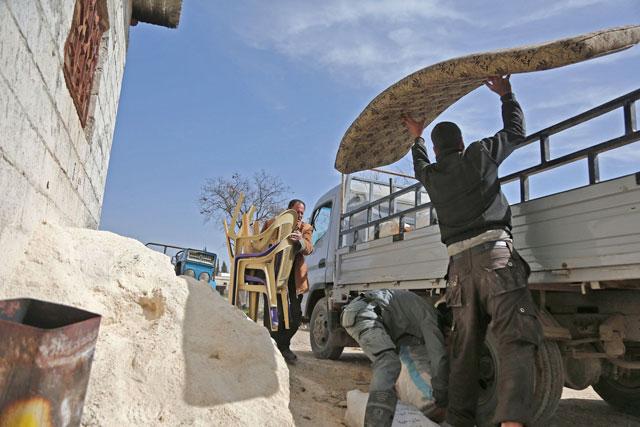You are here
UN aid chief says $8b needed for Syria
By AFP - Apr 24,2018 - Last updated at Apr 24,2018
BRUSSELS, Belgium — The head of the UN aid agency said on Tuesday that $8 billion needs to be raised at a donor conference in Brussels to help Syrians affected by the country's bloody civil war.
Mark Lowcock, the head of the United Nations Office for the Coordination of Humanitarian Affairs (UNOCHA), said resources for work inside Syria and with refugees in neighbouring countries were "desperately short".
Programmes may have to be cut back if funds are not forthcoming, he warned.
Donor countries, aid groups and UN agencies are meeting for the seventh international conference on Syria's future as the conflict, now in its eighth year, shows no sign of letting up.
The meeting comes in the wake of strikes by the United States, France and Britain on Syrian military installations in response to the alleged chemical weapons incident in Douma, which has been widely blamed on Damascus.
Ministers will gather to make financial commitments on Wednesday, with EU and UN officials hoping for doing better than the $6 billion pledged last year.
“We’re looking for $3.5 billion for urgent humanitarian assistance inside Syria for 13 million people and then $5.6 billion to help those countries bordering Syria who are hosting refugees,” Lowcock told AFP, saying around $1.2 billion had already been raised.
“Overall tomorrow what we’re looking for is $8 billion.”
Also on Tuesday, UN Syria envoy Staffan de Mistura urged the international community to prevent a fresh humanitarian disaster in the rebel-held region of Idlib, the likely next target of the regime’s fightback.
Mistura told a donor meeting in Brussels that Idlib risked suffering the same fate as Aleppo, seized in a Russian-backed Syrian offensive in 2016, and Eastern Ghouta, retaken by the regime shortly after an alleged chemical attack in early April.
“We were and are concerned on the humanitarian side by Idlib. Because Idlib is the big new challenge, 2.5 million people,” Mistura told a press conference with EU diplomatic chief Federica Mogherini.
“And you will not believe that all of them are terrorists of course. There are women, children, civilians, and this is looming up there,” he added.
“So we hope that this would be an occasion for making sure that Idlib does not become the new new Aleppo, the new Eastern Ghouta, because the dimensions are completely different,” Mistura added.
Mistura said a UN Security Council retreat in a secluded farmhouse in Sweden at the weekend called in a bid to overcome its paralysis on Syria had lowered the “temperature” but failed to find a political solution.
“After two weeks of terribly tense and rhetorically intense meetings, there was a need again to bring down the temperature,” Mistura said.
“Has this avoided or completely resolved the division which exists in the Security Council on Syria, which is the biggest problem the UN has... no,” he added.
“Has the atmosphere gone down and the understanding that there are common issues that can be faced together — yes.”
Mogherini and de Mistura both called on Russia, Iran and Turkey — the three powers involved in the so-called Astana process seeking peace in Syria — to do more to reach a ceasefire.
In 2017 and 2016 UNOCHA managed to raise only half of the money it needed for work in Syria, with donor countries increasingly under pressure to help out in other crises rather than the protracted, bloody Syrian civil war.
Lowcock called on President Bashar Al Assad and his international allies, particularly Russia, to do more to help Syrians suffering the effects of the conflict.
“The government of Syria obviously has a responsibility — which they accept — for their own people, and the more they can use their own resources for meeting basic needs rather than dropping bombs the better,” Lowcock said.
“The second is there are a number of countries that provide bilateral assistance to Syria, like Russia and the more of that that can happen on a larger scale the better as well.”
Moscow, along with Iran, is Assad’s key ally and Russian military intervention in Syria is widely seen as having tipped the balance of the civil war in his favour.
Related Articles
BRUSSELS, Belgium — Governments will seek more than $6 billion in aid for Syria at a two-day donor conference from Tuesday, which the Europe
BRUSSELS — The European Union and the UN are hosting a two-day conference on Tuesday on Syria’s future, with Russian-backed President Bashar
GENEVA — A Russian plan for a five-hour pause in fighting in Syria’s Eastern Ghouta needs to be expanded to allow aid deliveries to enter an












